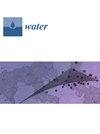Application of Hydrogeophysical Techniques in Delineating Aquifers to Enhancing Recharge Potential Areas in Groundwater-Dependent Systems, Northern Cape, South Africa
IF 3
3区 环境科学与生态学
Q2 ENVIRONMENTAL SCIENCES
引用次数: 0
Abstract
The application of hydrogeophysical techniques to delineating aquifers was conducted in De Aar, the eastern part of the Karoo region, Northern, South Africa. Previously, recharge estimations in this region assumed a uniform aquifer type, overlooking the presence of diverse aquifer systems. This study identified both unconfined and confined aquifers to improve recharge potential assessments. Vertical electrical resistivity sounding (VES) and ground telluric methods were applied. Six VES stations and eleven profiles were measured using a 1D Wenner array configuration. The VES data, processed with IPI2win software, generated a 2D subsurface model. In contrast, the telluric data were analyzed using an automated algorithm to create a 2D profile. The electric potential difference curve was interpreted in comparison with lithological cross-sections. The VES results revealed three to four distinct layers of low-resistivity (0.9–8.1 Ωm), moderate-resistivity (22.4–125 Ωm), and high-resistivity (68–177 Ωm) values, indicating three lithological formations. The telluric data suggested that shallow groundwater boreholes were located in areas with groundwater levels above 50 m. These findings, which matched the lithological data, pointed to a double-layer aquifer system, suggesting that recharge estimates should be carried out to different aquifer layers. The study demonstrated how hydrogeophysical methods can effectively delineate aquifer systems and enhance the identification of recharge areas.应用水文地质物理技术划定含水层,增强南非北开普省依赖地下水系统的补给潜力区域
在南非北部卡鲁地区东部的德阿尔,应用水文地质物理技术划定了含水层。此前,该地区的补给量估算假定含水层类型一致,忽略了多种含水层系统的存在。这项研究确定了无压含水层和承压含水层,以改进补给潜力评估。采用了垂直电阻率探测(VES)和地面碲化方法。使用一维温纳阵列配置测量了六个 VES 站和十一个剖面。使用 IPI2win 软件处理的 VES 数据生成了二维地下模型。碲化镉数据则通过自动算法进行分析,生成二维剖面图。电位差曲线与岩性横截面进行了对比解释。VES 结果显示了三至四个不同的层,分别为低电阻率(0.9-8.1 Ωm)、中等电阻率(22.4-125 Ωm)和高电阻率(68-177 Ωm)值,表明有三种岩性。碲化镉数据表明,浅层地下水钻孔位于地下水位高于 50 米的区域。这些发现与岩性数据相吻合,表明存在双层含水层系统,建议对不同含水层进行补给估算。这项研究表明,水文地质物理方法可以有效地划分含水层系统,并加强补给区的确定。
本文章由计算机程序翻译,如有差异,请以英文原文为准。
求助全文
约1分钟内获得全文
求助全文
来源期刊

Water
WATER RESOURCES-
CiteScore
5.80
自引率
14.70%
发文量
3491
审稿时长
19.85 days
期刊介绍:
Water (ISSN 2073-4441) is an international and cross-disciplinary scholarly journal covering all aspects of water including water science and technology, and the hydrology, ecology and management of water resources. It publishes regular research papers, critical reviews and short communications, and there is no restriction on the length of the papers. Our aim is to encourage scientists to publish their experimental and theoretical research in as much detail as possible. Full experimental and/or methodical details must be provided for research articles. Computed data or files regarding the full details of the experimental procedure, if unable to be published in a normal way, can be deposited as supplementary material.
 求助内容:
求助内容: 应助结果提醒方式:
应助结果提醒方式:


